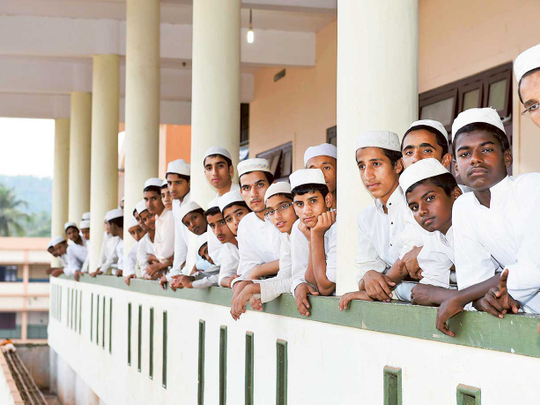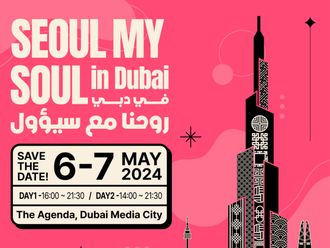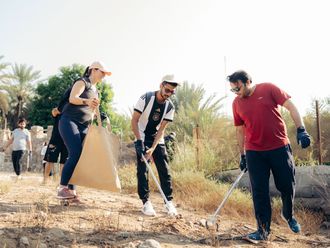
Kozhikode, India: “Can you close the door please,” asks a daily wager carrying a sack full of onions in chaste Arabic, as he tries to wriggle through the narrow passage between our bus and a mound of salt stacked in the bustling Big Bazaar of Kozhikode.
Arabic rings out from the crowded wholesale markets to the alleys, schools and shops and hotels of this coastal south Indian city in the state of Kerala, sounding as familiar as it would on the streets of Dubai or Abu Dhabi — reflecting the centuries-old linguistic and historic relationship the UAE and the Arab world has forged with India.
On the tranquil shores of Kappad beach near Kozhikode, earlier known as Calicut, fishermen sail out to the sea at dawn, hoping for a catch that will last them at least a few days. These are the same shores of the Malabar coast which brought the Portuguese explorer Vasco Da Gama to India in 1498, in his bid to establish an extensive Portuguese empire in Asia.
Spices and pulses at the Big Bazaar in Kozhikode. Arab traders would come here and sail away with dhows laden with spices. Chiranjib Sengupta/Gulf News
The only relic that reminds us of that mission is a small, decrepit monument that records his year of arrival. Seven-year-old Yasir and his friends play near the monument, climbing the trees around it and plucking sour green fruit from them.
But the close cultural and trade partnership that India has forged with the UAE and the wider Arab world also began on these shores, and has only strengthened through time.
“The relations between India and the UAE, along with the rest of the Arab world, are very historic and go back centuries,” Dr Hussain Mohammad Al Thaqafi, Vice-Chancellor of the Kozhikode-based Jamia Markazu Ssaqafathi, told Gulf News.
He was speaking at the cultural and educational institute’s headquarters in Kozhikode even as scores of students line up to greet the media delegation that has arrived from the UAE, ahead of the state visit of His Highness Shaikh Mohammad Bin Zayed Al Nahyan, Crown Prince of Abu Dhabi and Deputy Supreme Commander of the UAE Armed Forces, to India.
Indeed, Kozhikode, dubbed the ‘City of Spices’, emerged as a major trading hub of oriental spices from as early as the history of classical antiquities has been recorded. The capital of the former Malabar district, Kozhikode is where dozens of Arab traders would make their port of call from across the other shores of the Arabian Sea as early as the 5th and 6th century, bargain for the best deals in the bazaars and sail away with dhows full of the scent of cardamom and cloves.
While the linguistic and cultural links might be centuries old, they still find deep resonance in households across the state.
The monument marking Vasco da Gama’s arrival in Kappad, Kerala. Chiranjib Sengupta/Gulf News
For Amir Hassan, who studied at Markaz for 15 years and worked extensively in the Middle East before migrating to Australia, those cultural relations are quite special. “We don’t see the UAE as a foreign land. I have lived in many countries across the world, but the UAE has always felt like home. That’s the kind of synergy we feel between India and the UAE.”
The UAE obviously has a special place among those countries — he worked for five years as a supervisor at an Abu Dhabi company. For now, he is back with his alma mater to work as a HR manager.
Markaz, which runs dozens of charitable schools, tertiary educational institutions and orphanages across India, counts the UAE among its worldwide supporters. “The way people of different culture, beliefs and ethnicities co-exist peacefully in the UAE shows the all-embracing openness of the UAE. The diversity of India without compromising on its unity also displays those very qualities — and this is another common bond that we share,” says Al Thaqafi.
Those bonds have been further invigorated by the fact that thousands of people from this southern Indian state find employment across the UAE every year. “There are thousands of households across Kerala where the families survive on the basis of the remittances sent by their spouses or relatives working in the UAE. It’s hardly a surprise that many people from here call the UAE their second home,” says Jagadish K., whose Pallippuram Brothers has been in the spice trade business for more than 65 years in the heart of Kozhikode’s Big Bazaar or the central market.
Jagadish K. at his shop at the Big Bazar in Kozhikode. Chiranjib Sengupta/Gulf News
Dr Bahauddeen Mohammad Nadwi, Vice=Chancellor of the decades-old Dar Al Huda Islamic Univerity, tells Gulf News that the emergence of Arabic as a major global language has not only brought India and the UAE closer, but also helped forge close links between global cultures. “You can see Arabic signboards in London — it is a major world language, and our students are ready to take advantage of that as much as they arae ready for challenges in IT,” he says.
The proof of that is ready at hand: Mohammad Suhail, a final year graduation student at Dar Al Huda, tells Gulf News that he loves reading the kitabs (Arabic for books) of Shakespeare and Indian best-selling author Chetan Bhagat as much as he admires the Arabic language. If that’s not enough, he flaunts his skills in Hindi, Urdu and Malayalam and says his dream is to become a communications professional.
Based in Mallapuram district near Kozhikode, the charitable university enables needy but meritorious students to study, stay and eat for free till they complete their postgraduation. Students speak fluent Arabic alongside other Indian languages, and dozens of graduates from here go on to work as translators in the UAE.
During a media interaction, young students recite verses from the Quran in mellifluous voices and talk about strengthening the bond of culture and friendship with the forthcoming visit of Shaikh Mohammad Bin Zayed Al Nahyan, as well as the visit of Indian Prime Minister Narendra Modi to the UAE last year.
Maa Salama, says the hotel manager as we bid farewell to Kozhikode, before beginning a final, long conversation in Arabic with the delegation. Shamshuddin, 52, says he has spent the better part of his life in the Gulf, working for a variety of companies in the UAE and Saudi Arabia.
It seems that every household in Kozhikode has a story to tell and a dream to share that finally connects to the UAE and the wider Arab world. And although we say goodbye to the city, the all-pervasive cultural influence and heritage of the Arab world across Kerala and the rest of India can only get stronger with time.












